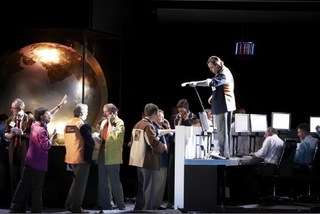|
Back
Don’t Run With Scissors Berlin
Deutsche Oper Berlin
02/04/2010 - & February 11
Richard Wagner: Der Fliegende Holländer
Hans-Peter König (Daland), Endrik Wottrich (Erik), Gregory Warren (Steersman), Ricarda Merbeth (Senta), Egils Silins (Dutchman), Liane Keegan (Mary)
Orchestra and Chorus of the Deutsche Oper Berlin, Jacques Lacombe (conductor)
Gisbert Jäkel (sets), Silke Willrett and Marc Weeger (costumes), Wolfgang Göbbel (lighting), Tatjana Gürbaca (production)

(Courtesy of Deutsche Oper Berlin)
February has added this early work in Wagner’s œuvre to the Deutsche Oper Berlin’s “Wagner Festival Weeks,” which have been running since November. Tatjana Gürbaca’s production premiered in June 2008 and will be featured in two performances. Reluctant though I am to use the current portmanteau “Eurotrash,” it is simply unavoidable. The nautical realm of the Dutchman and the more ordinary mortals he encounters is transposed from coastal Norway to the modern business world. Daland’s “ship” is a low-grade investment house; the crews of sailors bark into cell phones, follow computer monitors, and betray unabashed greed, general tastelessness, and soulless monotony. The Dutchman appears not from his own ship, but as an itinerant who happens by with a knapsack full of cash and diamonds. Senta is the boss’s trashy daughter, who sings her ballad in a hair salon and is courted by an Erik dressed down to fit in with the ranks of the urban poor. Gürbaca wants to place the opera in the rubric of crass globalization, but the visual impact is bland and often quite dull. This is a world without dreams, hopes, or redemption, though the opera is of course full of them. The only hint of spirituality comes in the form of Senta’s double, an adolescent girl who may be imagining the whole action. There is, however, no clear indication of her purpose. The production offers no hint of Senta’s sacrificial pity or the Dutchman’s ardent longings. Their duet, delivered almost mechanically, ends with a blood oath administered with the help of a pair of scissors. At the end of the opera, Senta uses them to slash the throat of the forlorn Erik and then to commit suicide, an act in which she is joined by the entire women’s chorus with the same pair of scissors, passed from hand to hand. The redemptive music of the opera’s finale closes this scene of murder-suicide with a hopelessness that left me depressed, but more out of boredom than pathos.
Good singing can enliven even the most unmoving productions, but it was not firmly in evidence. Hans-Peter König took the greatest plaudits in the role of Daland. His stentorian bass soared throughout the hall. Ricarda Merbeth is appearing in Wagner roles all over Europe and delivered a fine Elsa in Lohengrin during the Deutsche Oper’s festival. Her Senta lacked subtlety. This could have been a fault of the production, but the notoriously difficult ballad suffered from shrill phrasing. Her duet with Egils Silins’s Dutchman betrayed better musicianship, but Silins’s is too young for the part. He does not lack power, but the refined legato and necessary delicacy (again, perhaps a casualty of the production) for the first act monologue and the duet eluded him. Endrik Wottrich’s Erik recalled how fine Wagner’s lesser tenor roles were created and made one notice the inevitably slight part more than usual. Jacques Lacombe led a lackluster orchestral effort. The overture, one of Wagner’s more dynamic, was painfully slow and disjointed. The rest of the opera raced along without much reflection.
Paul du Quenoy
|